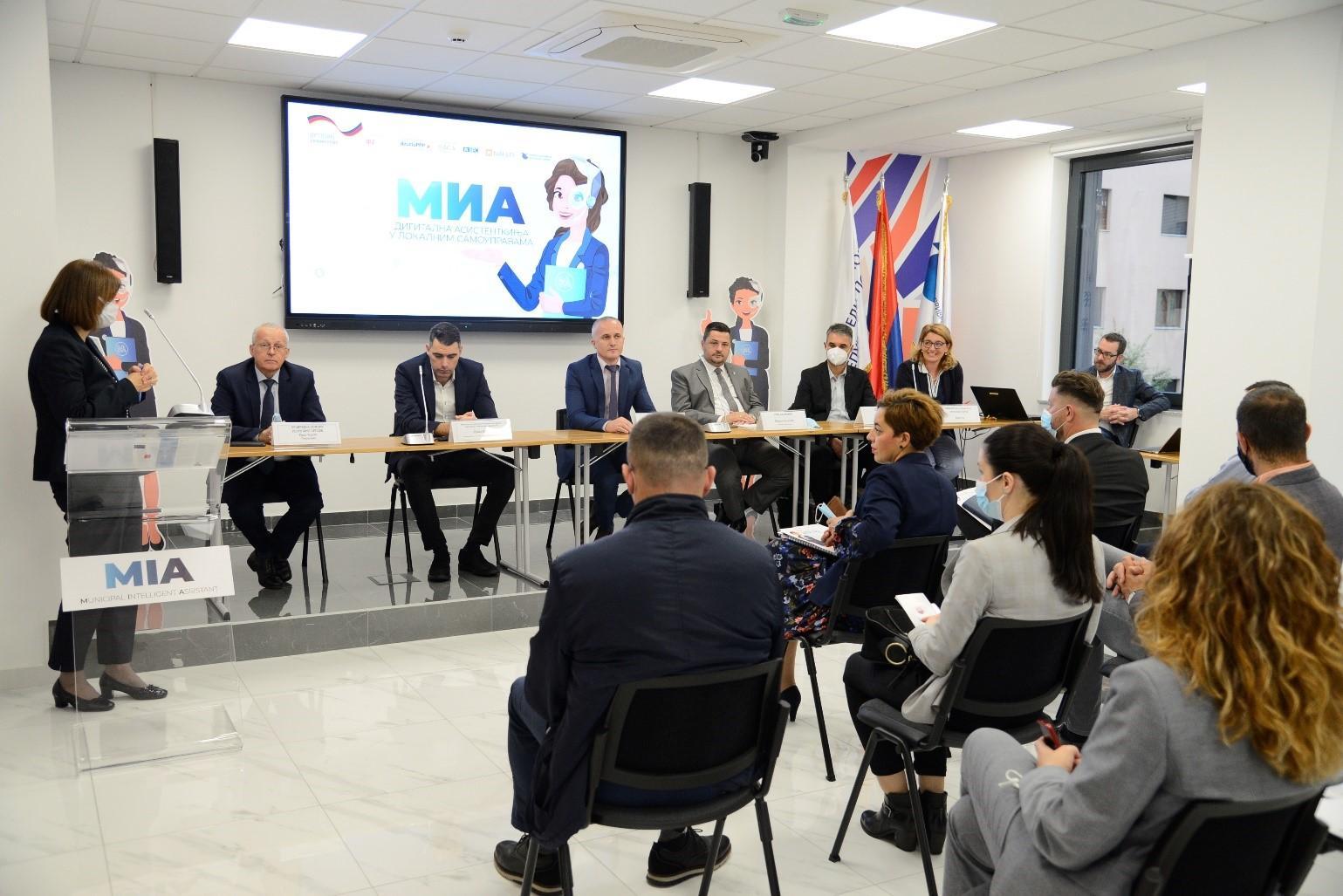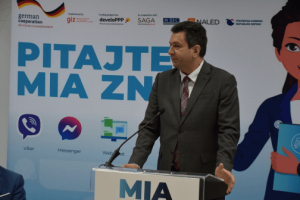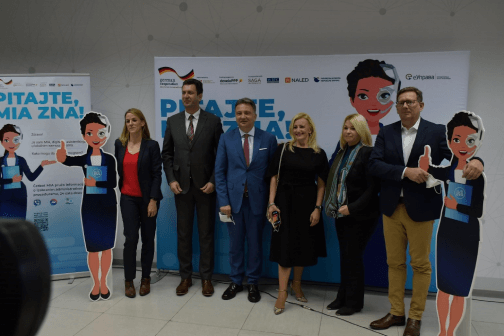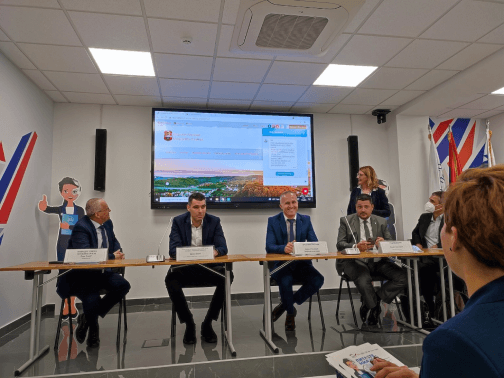The Virtual Assistant MIA (Municipal Intelligent Assistant) is providing information on the most sought-after administrative procedures and in real time, via viber and city portals in 4 pilot local governments in Serbia and Bosnia and Herzegovina as of October. She is also responding to citizens’ queries in regard to general information such as working hours and contact details of local authorities. This is announced at a conferences on the occassion of the release of this platform, which are held in Belgrade and Banja Luka.
Mayor of Sabac, Mr. Aleksandar Pajic stressed that citizens of Sabac will be able to answer questions related to the issuance of birth certificates, citizenship certificates, tax certificates and rights related to parental and children’s supplements, while, according to Sombor City Administration Chief Jelena Velebit, citizens of Sombor will now be able to learn more easily and quickly how to obtain the right for parental and children’s supplement, as well as to inquire information about the procedure for determining the level of tax debt and issuing certificates of settled liabilities on the basis of local public revenues.
Sombor and Sabac are the first two cities in Serbia, while Bijeljina and Laktaši are the first two cities in BiH that launch their “virtual assistants”. This innovation was developed through the project “Improvement of Municipal Services in Serbia and BiH with the introduction of a AI chatbot application” within the programme for development partnership with private sector (develoPPP) of German Federal Ministry of Economic Cooperation and Development (BMZ) implemented by GIZ in cooperation with private company SAGA, and the Regional Business Environment Network in Southeast Europe (BFC SEE) whixh are represented by National Allience for Local Economic Development (NALED) and the Chamber of Commerce of Republika Srpska.
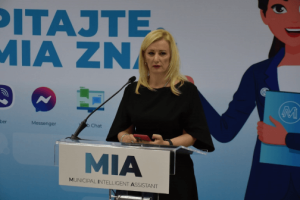 – Our analysis showed that employees in Sabac and Sombor spend up to 2,400 hours a year responding to citizens’ queries about selected administrative procedures, preventing them from dedicating themselves to more complex processes, which cannot be digitised yet. Therefore, MIA has a role to play in relieving employees on the one hand and to provide citizens with even better quality service, on the other. Communication is possible through Viber and webchat at city portals, and via the Facebook Messenger application will be enabled soon, said NALED Executive Director Ms. Violeta Jovanovic.
– Our analysis showed that employees in Sabac and Sombor spend up to 2,400 hours a year responding to citizens’ queries about selected administrative procedures, preventing them from dedicating themselves to more complex processes, which cannot be digitised yet. Therefore, MIA has a role to play in relieving employees on the one hand and to provide citizens with even better quality service, on the other. Communication is possible through Viber and webchat at city portals, and via the Facebook Messenger application will be enabled soon, said NALED Executive Director Ms. Violeta Jovanovic.
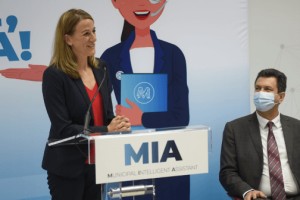 – The project will show the benefits of the digitization process for all participating public and private actors throughout the region and broadly promote digital culture. We strongly believe that the knowledge and experience which will be created within the project will also be beneficial for other local governments throughout regional exchange and transfer of knowledge by networks such as BFC SEE – said Ms. Daniela Funke, Country Director of GIZ in Serbia.
– The project will show the benefits of the digitization process for all participating public and private actors throughout the region and broadly promote digital culture. We strongly believe that the knowledge and experience which will be created within the project will also be beneficial for other local governments throughout regional exchange and transfer of knowledge by networks such as BFC SEE – said Ms. Daniela Funke, Country Director of GIZ in Serbia.
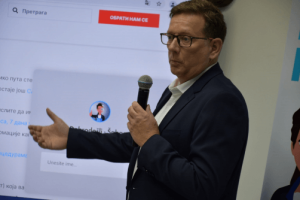 The director of the software solutions division at SAGA, Mr. Milan Jevtic, who demonstrated the work of chatbots, noted that MIA is based on artificial intelligence, which makes talking to her like talking to another person. “MIA is already ready to communicate in dozens of scenarios, and by all characteristics it is at the same and higher level than similar solutions in the most developed countries of the world,” Jevtic said.
The director of the software solutions division at SAGA, Mr. Milan Jevtic, who demonstrated the work of chatbots, noted that MIA is based on artificial intelligence, which makes talking to her like talking to another person. “MIA is already ready to communicate in dozens of scenarios, and by all characteristics it is at the same and higher level than similar solutions in the most developed countries of the world,” Jevtic said.
The project “Improving Municipal Services in Serbia and BiH by introducing a chatbot application” aims to demonstrate active and functional use of chatbots at the local level, where citizens and businesses will benefit the most from improved, more affordable and simplified procedures for providing information about local government services.
President of the Chamber of Commerce of Republika Srpska, Mr. Pero Coric, said that it is very important to foster digitisation in local governments so that business entities, as well as citizens, have firsthand information, as is the case with the chatbot application, which will provide important information 24 hours a day, 7 days a week. He stated that this project is being introduced into those local communities that are certified for a favourable business environment (BFC) and that the software can be upgraded, and will be successful as long as local communities supply the platform with information.
The head of the Department for Development of Electronic Governance at the Ministry of Scientific Technology Development, Higher Education and Information Society of Republika Srpska, Dusko Baric, said the ministry is strategically oriented to the development of electronic governance and will facilitate administrative procedures for citizens.


